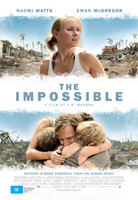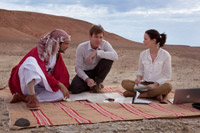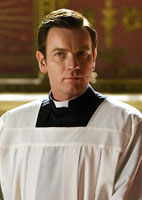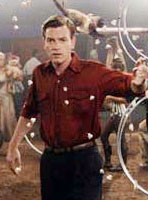Ewan McGregor Our Kind of Traitor
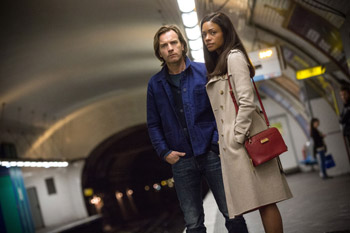
Ewan McGregor Our Kind of Traitor
Cast: Ewan McGregor, Stellan Skarsgard
Director: Susanna White
Genre: Thriller
Synopsis: A dozen ballerinas pirouette across the stage of Moscow's Bolshoi Ballet. A muscular male dancer (Carlos Acosta) glides between them. He is exquisite, an arresting vision of masculinity. A glorious leap brings the performance to a close and the audience erupts into applause so loud it sounds like gunfire. As the curtain falls, a group of smart women exit quickly from their ornate box make their way through a maze of corridors lined with pictures of Russia's cultural icons to a backstage room. There are champagne and canapés for the women, who include Olga (Dolya Gavanski) and her 18 year-old daughter Anna (Maria Fomina). Olga's husband Misha (Rasha Bukvic) signs a sheaf of papers, hands them over to Nicolas Petrov, known as the -Prince' (Grigoriy Dobrygin) and his consigliore, Emilio Del Oro (Velibor Topić), and in thanking him is given an ornate and historic gun. Later that evening the family drive away, giddy with relief, heading for a longed-for reunion with Anna's younger twin sisters. But what looks like a routine checkpoint on the edge of a glittering, snow-covered forest, turns out to be a cold-blooded assassination and the fleeing family are quickly and clinically gunned down.
In Marrakech, Morocco, an attractive British couple are having dinner. Perry (Ewan McGregor), a professor of poetics at the University of London, and Gail (Naomie Harris), a successful barrister, are on holiday, attempting to repair their marriage following Perry's affair with a student. When Gail returns to their hotel room to take a work call, Perry catches a noisy group of Russian businessmen, presumably holidaying oligarchs, eyeing her as she leaves. Entirely unabashed, their uninhibited carousing provokes a spark of envy in Perry. He is miserable over the unhappiness he has caused Gail and disappointed by what a middle-aged cliché he has become. As Gail's career has soared, Perry's has stalled and he is ashamed of how hard he is finding it to enjoy life as a -new man'. The rowdy oligarchs do not look like men often troubled by thoughts of what it means to be men in the 21st Century. The leader of the group is Dima (Stellan Skarsgård), a huge bull of a man in a leather jacket, smoking a cigar. With him is Andrei (Marek Oravec), a handsome lawyer-type in a smart suit, and a baby-faced bodyguard called Niki (Alec Utgoff). Dima waves Perry over but, typically British, Perry resists at first before being reluctantly drawn into their boisterous circle. With Gail still working, he agrees to go with them to a party at a villa in the Atlas Mountains.
Amid a tableau of Dionysian excess, very far from the London dinner parties Perry normally attends, he begins to relax and enjoy the fascinating glimpse into Dima's world. But when he hears a woman being violently attacked, a drunken Perry reacts instinctively and squares up to a naked, tattooed man twice his size, bearing a knife. When Dima reveals the man is a member of the Russian mafia, it dawns on Perry the kind of world in which Dima resides. For Dima, the incident has revealed a different kind of man lurking just beneath Perry's rather crumpled appearance.
Seduced by Dima's exuberance, Perry agrees to bring Gail to meet him and his family for a game of tennis the next morning. Perry and a slightly bemused Gail are introduced to Dima's reserved wife Tamara (Saskia Reeves), his Jane Austen-reading, 18-year daughter Natasha (Alicia von Rittberg), and his sons Alexei (Emmanuel Brook), aged 13, and Viktor (Matthew Brook), aged 11. Gail befriends two six-year old twin girls, Katya (Rosanna Beacock) and Irina (Emily Beacock), who casually reveal their real parents are dead. When Dima directs his considerable charm at Gail, she finds herself accepting his invitation to attend Natasha's birthday party at the family's villa that night.
This time the vibe is more magical than debauched and Gail, who is lovely in her Zara dress, is wide-eyed as she takes in the opulence. As Gail is drawn into a game of hide-and-seek with the twins, Perry is lured away by an attractive woman he met the night before. But seduction is not on her mind and instead she takes him to the rooftop where an agitated Dima emerges from the shadows. Dima takes advantage of the magnificent firework display distracting his bodyguards to reveal he is the top money launderer for the Vory (Russian Mafia). His best friend was Misha, the father of the twins, who worked for him. It was after Misha signed over his accounts in Moscow that the Prince, who is the new, unscrupulous head of the Vory, had him killed. Now Dima is in mortal fear for his own safety and that of his family.
He has decided to defect to Britain with them, in exchange for information on the Russians - both the mafia and the state. He needs the bewildered and open-mouthed Perry to hand a memory stick to MI6 when he arrives back at Heathrow.
Terrified but unsure what else to do, Perry does just that the next day at the airport. He and a stunned Gail are immediately pulled into a drab room at Heathrow and questioned by the polite and dapper MI6 agent Hector Meredith (Damian Lewis) and his colleague, the handsome Luke (Khalid Abdalla). Although he does not yet know what information Dima has, Hector's interest is piqued. Hector knows all about the dirty money swilling around the City of London and the stain it is leaving on British finance and politics. But Dima has put Perry and Gail between them, two innocents now ensnared in the murky, dangerous world of international espionage and dirty politics. Can they really help to save a charismatic Russian gangster, his desperate family and ultimately themselves?
Our Kind of Traitor
Release Date: July 14th, 2016
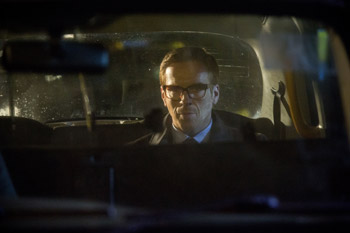 About The Production
About The Production
The Genesis Of Our Kind Of Traitor
'One of the strengths of John le Carré's work is that he incorporates very important themes into a rollercoaster ride of a thriller," says screenwriter Hossein Amini of le Carré's novel Our Kind Of Traitor, which he has adapted into a major new feature film of the same name, directed by Susanna White and starring Ewan McGregor, Stellan Skarsgård, Damian Lewis and Naomie Harris.
'The audience is thrown into the shoes of an innocent couple and there are dangers lurking around every corner," Hossein Amini explains. 'But along the way le Carré is also saying a lot about the world in the years post the global economic crash of 2008, and about the influence of Russia and Europe on Britain. He personalises the story through the characters we meet along the way."
Our Kind Of Traitor is produced by Gail Egan of Potboiler Productions, with Simon Cornwell and Stephen Cornwell of The Ink Factory. The two companies recently collaborated on another le Carré adaptation, A Most Wanted Man. It is financed by Film4 and Studiocanal, which also has international rights to the project. Potboiler enjoys a long-standing relationship with le Carré, having previously produced two acclaimed screen versions of his novels: Fernando Meirelles' Oscar®-winning The Constant Gardener in 2005, in addition to Anton Corbjn's 2014 adaptation of A Most Wanted Man.
'We were lucky enough to read the book prior to publication," says Gail Egan. 'It was obvious straight away. It's a great book. It's a great story and it has great characters. It is very cinematic."
Our Kind Of Traitor is the dramatic story of an unsuspecting married couple, Perry (Ewan McGregor) and Gail (Naomie Harris) on holiday in Marrakech, who meet the flamboyant and charismatic Russian, Dima (Stellan Skarsgård). He befriends them over games of tennis and lavish parties at his villa before revealing he is the top money launderer for the Russian mafia and wants to defect with his family to Britain. From that moment on, Perry and Gail are thrown into the fractured, dangerous world of international spies and dirty politics as they endeavour to save Dima and his family, and ultimately themselves. Indeed, Our Kind Of Traitor captures a very British fascination with espionage, international double-dealing and Britain's place in the world. 'It was a very strong, very relatable story," says producer Simon Cornwell, who is also le Carré's son. 'An everyman and an everywoman couple caught in a world that overwhelms them and charts their journey through that. It was a very natural to take to the screen."
Set in London, Marrakech, Paris, Bern and the French Alps, director Susanna White, whose breadth of work ranges from Working Title's Nanny McPhee and the Big Bang to HBO's hard-hitting Generation Kill (about the US invasion of Iraq) to BBC period dramas such as the BAFTA winning Bleak House, Parade's End and Jane Eyre, was drawn to the very cinematic aspect of the story, as well as its very contemporary themes. White is one of the few women in the world directing films on this scale.
'What made this stand out for me was that it is a very modern story," she explains. 'I have grown up with le Carré and most of his other stories have looked backwards into the past and been set in a world of darkish interiors. Our Kind Of Traitor is a big road movie, travelling across five countries.
'It is a le Carré for now," she continues. 'People in MI6 might now be working counterterrorism. I deliberately cast Khalid Abdalla, a Middle Eastern actor, to play Luke, because that is the MI6 we've got now. I hope it will make people think about the world that we live in."
Damian Lewis, who plays British MI6 agent Hector Meredith, explains it is as much a character piece as it is a suspenseful thriller. 'It's not a -who done it', it's more of a -can they do it?'"
Adapting The Novel For The Screen
Hossein Amini is one of the UK's most accomplished screenwriters, with credits including The Wings of a Dove, Drive, and an adaptation of Patricia Highsmith's The Two Faces of January, which also marked his feature film debut as a director. A natural choice to adapt Our Kind Of Traitor, he was fortunate to be slipped a copy of le Carré's as-yet-unpublished manuscript by the agent he shares with le Carré (real name – David Cornwell).
'I loved it from the moment I read it," declares Hossein Amini. 'I quickly phoned and said -I really desperately want to do this'. I then had to meet David Cornwell to discuss how to do it and he very generously said -yes I would love you to do it'."
Hossein Amini worked closely with le Carré on the first couple of drafts. 'I would write and he'd give me notes," says Hossein Amini of their collaboration. -'John le Carré had always been a big hero of mine so it was a fantastic opportunity to work with him. It was like meeting a man with an extraordinary brain. I learnt so much from those two or three days I sat down with him. It was the highlight of my screenwriting career to exchange ideas and work on the script with him and to talk about ideas. It's fantastic when a person lives up to your expectations."
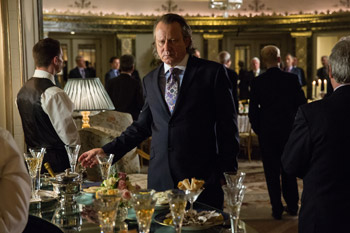 'As a screenwriter you need collaborators to get the script in the right place," says Hossein Amini. 'Everyone works differently and has different approaches but I got a lot out of working with all them."
'As a screenwriter you need collaborators to get the script in the right place," says Hossein Amini. 'Everyone works differently and has different approaches but I got a lot out of working with all them." 'There are a lot of expectations about making a le Carré film," says Susanna White. 'People imagine it as people meeting in alleyways, lots of dark interiors, usually a grey- brown world of the past. Part of my challenge as director was to bring something new to it in exploring the areas I wanted to explore. But also to make the le Carré fans not feel cheated and to feel they were getting something that would honour a very specific piece of literature."
Le Carré's novels always drill with piercing acuity into the global issues of the day: the pharmaceutical industry in The Constant Gardener; the war on terror in A Most Wanted Man; in Our Kind Of Traitor it is private finance and the impact of Russia - specifically Russian money - on the entire spectrum of British society, from finance to politics to the streets of London, which comes under scrutiny.
'One of the themes of le Carré's work is that Britain has almost declined as a world power but we still have these British values that come from a time when Britain was on top of the world and had a moral responsibility," Hossein Amini suggests. 'As that power has waned, that morality has turned into something far more like compromise. He is very interested in the impact of the decline of British power on a moral system. That's what our film is about. There are those who are willing to anger the Russian authorities to help this man Dima escape, and there are those who are opposed to that and are probably working with the Russians, all within the British system."
Our Kind Of Traitor deftly wraps these weighty issues inside universal imponderables including what it means to be a man in the 21st century.
'Perry's character is struggling to define who he is," says Susanna White. 'At the start of the movie he feels lost, his wife is much more successful than he is and his journey is one of redefining himself as a man, which he discovers on his journey with Dima. We have a couple in crisis needing to heal and repair their relationship."
Casting Ewan McGregor and Naomie Harris as Perry and Gail
The relationship between the attractive, comfortably-off Perry, a university lecturer in poetics, and Gail, a very successful barrister, starts in a very broken place. That was an interesting dynamic for the two actors to play. Everyman superstar Ewan McGregor was the first of the film's high-powered cast to join the project. 'Ewan McGregor was on early and first as Perry," says producer Gail Egan. 'He was involved from quite an early stage of development and stayed with us through many drafts. He was perfect."
Ewan McGregor, who boasts an eclectic career with memorable roles in films including Moulin Rouge, the Star Wars franchise, and most famously as the heroin addict Renton in his break-out film Trainspotting, plays regular guy Perry, a man in his mid-40s whose life has not turned out how he hoped it would. He is a little bit lost and looking for a way back to his life, not entirely unlike the hopeless souls recruited by the Russian mafia in jail to the Vory, a real-life organised crime cohort. For the actor it was, as always, about the quality of the script. 'It's harder and harder to find movies like this," Ewan McGregor admits. 'But it's what le Carré does best in that his characters are very real, very human characters and in this case even more so because he's put two civilian people into the world of espionage. He's plonked them right in the middle of this thriller. That's interesting because you think, -What would I do in this situation? How would I react?'"
Ewan McGregor read the script before going to the book. 'Perry is more serious and quiet and withdrawn in the book and he's been brought forward a little bit in the screenplay but he's still quite a thoughtful, quiet character," Ewan McGregor says. 'Gail Egan absolutely holds her own and it's a very modern marriage in that respect, there's nothing traditional about it and there's no husband and wife roles. They're both in this thing together and she gives as good as he does. You see the consequences of what they're doing and how it affects both of them. It's quite nice as it's quite unusual."
For Hossein Amini, Ewan McGregor is the perfect Perry, dressed in vintage-looking jeans, boots and leather jackets. 'I love the idea of Ewan McGregor playing Perry, because as an actor what I've always admired in his work is that there's an edge and a toughness but there's also something incredibly vulnerable and innocent," says the screenwriter. 'Perry is thrown into this world and copes with it pretty heroically but at same time is almost wide-eyed in his purity and his reaction to the moral compromises and the darkness in people he is witnessing.
'What's great about Ewan McGregor is that he feels morally so solid," Hossein Amini continues. 'You really sense his outrage and his disappointment in people, but also the toughness and an edge that allows him also to be an action hero, and that's required too. It's that combination that makes him so ideal."
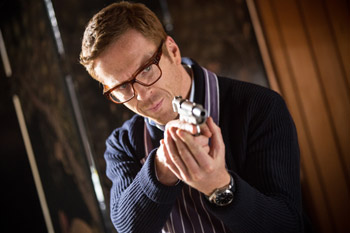 Susanna White praises Ewan McGregor's ability to engage with audiences. 'He and I talked early on about the challenges of playing a real relationship of people whose marriage is in trouble," she says. 'He liked the idea of scrutinising what it felt like to be slightly emasculated by a wife who's more powerful than you are. In theory if you ask Perry whether he thought it would be good to have high achieving women, he would say -of course, women deserve that.' But when he is faced with his own situation he starts to feel threatened by Gail Egan and challenged by it. Part of the challenge was keeping audience appeal while seeing his weakness at the beginning of the film and his journey to rediscovering himself, who he is and redefining his relationship of with Gail Egan. It was a very interesting journey with Ewan McGregor. He wasn't afraid to play a character that was weak at the beginning of the film but who gains in strength.
Susanna White praises Ewan McGregor's ability to engage with audiences. 'He and I talked early on about the challenges of playing a real relationship of people whose marriage is in trouble," she says. 'He liked the idea of scrutinising what it felt like to be slightly emasculated by a wife who's more powerful than you are. In theory if you ask Perry whether he thought it would be good to have high achieving women, he would say -of course, women deserve that.' But when he is faced with his own situation he starts to feel threatened by Gail Egan and challenged by it. Part of the challenge was keeping audience appeal while seeing his weakness at the beginning of the film and his journey to rediscovering himself, who he is and redefining his relationship of with Gail Egan. It was a very interesting journey with Ewan McGregor. He wasn't afraid to play a character that was weak at the beginning of the film but who gains in strength. 'The other thing we were both keen on was the idea of a mixed race relationship," Susanna White continues. 'Again it was part of the idea I had to make le Carré feel very modern and very much a 21st century le Carré. You have this wonderful high achieving woman who happens to be black."
Co-star Naomie Harris describes Ewan McGregor as the ideal co-star. 'He's such a phenomenal actor and just a great guy," she enthuses. 'From the very first moment I met him he was incredibly down to earth. He has a really great sense of humour and is very hard working."
Ewan McGregor repays Naomie Harris the compliment.
'Interestingly, and this is why it's such good writing, as the deal between Dima and MI6 becomes more chaotic, their relationship mends," he points out. 'The two arcs of those storylines go hand in hand. Through it all Perry and Gail find each other again and remember what it is they love about each other. By the time the film ends they are in a much better place."
For her part, Harris was energised to play a character she recognises as real. Dressed by costume designer Julian Day as a Hitchcock heroine in plenty of Aquascutum and Burberry, Gail is struggling with a deep sadness about her husband's betrayal at the beginning of the film. 'You don't really see that in most films," says Harris. 'It's usually the reverse and you see a couple who aren't together and are finding their way and it's lovey-dovey at the end and they get together and it's all happily-ever-after. You never see what happens after the happy-ever-after. 'There are bumps in whatever relationship, no matter how good. It is nice to see a mature relationship which is going through a very serious hiccup and is managing to find a way through."
Indeed, casting a partner for Ewan McGregor was an interesting process. 'Gail Egan has her own role and she drives the story forward at some points, but she also has to support him," Gail Egan explains. 'She is this feisty lawyer who brings a lot to their relationship, and she makes us want to see them succeed as a couple. She is obviously desperate to put their relationship back together again while still trying to make sense of why it went wrong in the first place. She is a very sympathetic character and it really helps us root for them as a couple."
Stellan Skarsgård is Cast as Dima
Finding the right actor to play Dima was one of the most crucial elements of the project to get right. 'One of the first things that drew me to the project was Dima," admits Susanna White. 'When I met David Cornwell, aka John le Carré, he started acting out Dima for me. He was really funny and charismatic and warm. You could sense the danger in him, but the big thing David Cornwell said to me was he wanted Dima to be funny, and I loved that. I always love surprise in characters that they don't play the one note suspected."
In Stellan Skarsgård, they found an actor capable of embracing this huge character. 'He needed to able to be part crook, part Russian Vory member, and part man of honour," says Gail Egan. 'We needed someone with international recognition and appeal. Stellan Skarsgard was perfect."
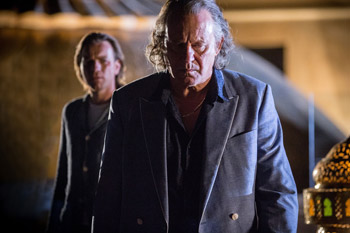 As kismet would have it, Stellan Skarsgård was the actor in Hossein Amini's mind when he was crafting the character of Dima.
As kismet would have it, Stellan Skarsgård was the actor in Hossein Amini's mind when he was crafting the character of Dima. 'There is something about his size, his humour and wryness but also an ability to go very deep emotionally and be very tender and moving in moments of silence," the writer explains. 'When we finally got to cast him I was thrilled."
This was a part into which Stellan Skarsgård could really get his teeth. 'Dima is a money launderer but he is a Vor with the Vory, a kind of mafia that comes from the prisons in the old Soviet system. The Vory is an organisation where the State is the enemy and you had to swear never to cooperate with the State," he explains. 'In the film the modern version of the Vory has started cooperating with the State and with the Kremlin and those strict borders have been erased. To Dima, an old warrior, that is outrageous, that is treason. But it also means he is in conflict with the leadership and it means those people will kill him. And not only him but his family too. Dima is trying to save his family."
Susanna White and Stellan Skarsgård talked a lot about where the actor should take the character. They decided to place a great deal of emphasis on the notion of Dima as a family man. It was something Stellan Skarsgård, a father of eight children, could easily relate to. Stellan Skarsgård's great achievement is to convince us this tender figure is also capable of extreme violence.
'We wanted to have a big, warm charismatic guy, who really cares about family, but at the same time the reality of his life is he's been out in the gulags, and he is a gangster," says White. 'Those two things can sit happily together, which is part of the brilliance of Stellan Slarsgard's acting. He makes you believe both those things."
White enjoyed the collaborative relationship she forged with Stellan Skarsgård.
'Part of what I love about working with actors is that everyone is different, and everyone has different needs," she explains. 'Some people need to be filmed at the beginning of the day. They do their best takes early on. Other people work their way into a scene. The wonderful thing about Stellan Skarsgard was he had a clear idea about the way he wanted to play Dima, but he always wanted lots of suggestions as well. He wanted to try scenes lots of ways, so he just goes at it all day long with incredible energy and focus and good humour. Although you see the intensity in his concentration, he never lets it get to him either. You get someone of that level and everyone else's game goes up. It's like the best types of tennis players playing together, everyone spurs each other on."
She relates a telling anecdote about the perfectionist actor: 'It was a real coup to get Stellan Skarsgard. He came to me quite early on and said -I'd like to have a closed set.' I said -Yeah that's fine.' I was assuming those were for the scenes of nudity in the changing room. But he said, -I meant for the tennis, I'm really embarrassed. I am completely fine with any nudity, I am Scandinavian. But I'm a terrible, terrible tennis player,'" White laughs. 'I said -I'm sure it is going to be fine, we will keep unnecessary people away.' The first day, the tennis coach said to me, -Well, we are making some progress as Stellan Skarsgard has now stopped running away from the ball.' He did brilliantly, because he went from not being able to play tennis to actually looking like Dima enjoys a match now."
Susanna White and Stellan Skarsgård put plenty of thought into the character of Dima's wife, Tamara (Saskia Reeves) and their marriage. As written, there was very little of Tamara on the page. This gave the director and her two actors a lot with which to play.
'Stellan Skarsgard and I were interested in Dima's relationship with Tamara because Perry and Gail Egan learn from them and they learn about marriage from that relationship," White points out. 'We cast a fantastic actress, Saskia Reeves, on blind faith. We said to Saskia, -This role is really important; even though if you count your lines in the script, there is hardly anything.' And Saskia came on that journey with us.
'I love how real that marriage is," Susanna White continues. 'It is one of the remarkable things about Stellan's acting, that he created a marriage with virtually no dialogue. By the end of the movie, Perry and Gail Egan have a marriage that in some ways mirrors Dima and Tamara's. Even though Dima has had affairs and not been totally faithful to Tamara there is something completely solid about their relationship."
After first meeting on the set of Angels and Demons in 2009, Stellan Skarsgård and Ewan McGregor were delighted to be working together again. 'When you watch Stellan Skarsgard in Dima's shoes you just can't imagine anyone else playing this part," says Ewan McGregor. 'He embodies Dima. He's such a great actor and I really am so fond of him as a man."
The outfits chosen by costume designer Julian Day for Stellan Skarsgård were slightly larger than life, and included a lot of animal skins and unusual fabrics.
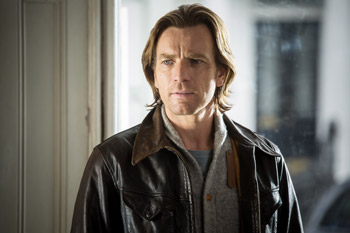 'You start out researching what people actually look like and what I found is that people look quite boring, in a sense that they are not as interesting -looking as cinema would want to see them," says Julian Day. 'That's essentially what I did with the Russian Vory. I was quite disappointed when I started researching what they look like, and there aren't really that many pictures of them anyway. Even though they have a lot of wealth they don't necessarily show that in their clothing. It's expensive but not necessarily interesting. It's not even ostentatious. They look quite tough, but they don't look particularly cinematic and we're making a film here, you need poetic licence. 'So you base yourself in fact to begin with then you create a world that suits the drama and suits the film and suits the characters. Dima's bodyguards are dressed more sedately as I wanted to create a black and white world with Dima standing out."
'You start out researching what people actually look like and what I found is that people look quite boring, in a sense that they are not as interesting -looking as cinema would want to see them," says Julian Day. 'That's essentially what I did with the Russian Vory. I was quite disappointed when I started researching what they look like, and there aren't really that many pictures of them anyway. Even though they have a lot of wealth they don't necessarily show that in their clothing. It's expensive but not necessarily interesting. It's not even ostentatious. They look quite tough, but they don't look particularly cinematic and we're making a film here, you need poetic licence. 'So you base yourself in fact to begin with then you create a world that suits the drama and suits the film and suits the characters. Dima's bodyguards are dressed more sedately as I wanted to create a black and white world with Dima standing out." Stellan Skarsgård describes Julian Day as having a very specific taste. 'He takes everything a bit further but with style," says the actor. 'The costumes in this film, for being a contemporary film are done with a lot of freedom and a lot of expression which makes it great fun to wear those strange clothes."
Damian Lewis Creates The Character Of Hector
In le Carré's novel, the character of Hector Meredith is much older than the actor Susanna White cast as the veteran M16 agent.
'It was quite a big choice to have Damian and I was thrilled with it. Damian is such a wonderful actor and has made some very interesting choices himself," she says. 'Hector is a lonely character. He is divorced and he has a son in jail. Like all of le Carré's characters, he is flawed. He is someone seemingly under control but as the film goes on you begin to see the problems in his life. That is one of the great things about the movie for me, everyone's got lots of layers to them, there are lots of shades of grey and there's no right or wrong. Instead, there is a lot of moral ambiguity. That is what you get from le Carré."
Hector is a passionate man who believes the end justifies the means, even using civilians to achieve his goal. 'Hector is really determined and prepared to stop at nothing," says producer Gail Egan. 'That passion is very infectious on screen and it was a great character for Damian to play."
Damian Lewis, whose diverse credits include the morally ambiguous US marine Nicholas Brody in TV series Homeland and King Henry VIII in the BBC's adaptation of Wolf Hall, sees Hector as a spy burdened with a conscience. He turned to the book to be able to reach into Hector's fascinating backstory which includes a stint as a financier in the City of London. He left when he became disillusioned by the corruption he found there.
'Hector is a bit of an iconoclast, he rejects conventions and he's fallen foul of the system once before, and was cast out in the cold by MI6 before coming back into the service," says Damian Lewis of Hector, who Julian Day has dressed in an Aquascutum coat and Oliver Goldsmith glasses, recalling Michael Caine in The Ipcress File. 'When we meet him, we meet a man who is presented with an opportunity to go after a politician called Aubrey Longrigg MP (Jeremy Northam), a former head of MI6. Hector believes he is responsible for putting his son in jail. Longrigg is also caught up in a plot laundering money in the City of London. Hector is presented as a man of principle. He has a strong moral code but is also possibly a little vengeful."
Writer Hossein Amini describes Damian Lewis as one of the very best kind of actors. 'It makes the writing and the film so much richer when an actor goes away and makes a character their own through their research and their own personal experiences and the way they use their costumes," he says. 'They take something which is two-dimensional on the page and make it three dimensional. They make the writing look better by doing that. I am always thrilled when an actor says, -Thanks for that part but now I need to go away and turn what you've written on the page into a real person'. That's when the magic happens. Damian Lewis is one of those actors who does that effortlessly."
As part of his preparation, Lewis was invited to a Special Forces club where he met several men who work for the Foreign Office abroad. 'We talked about their social lives and what drove them to work for MI6," Damian Lewis recalls. 'Was it a patriotic zeal or an intellectual curiosity about the work? I tried to ground Hector in my meeting those people who have served."
Damian Lewis attended the Guildhall School of Music and Drama at the same time as Ewan McGregor (Ewan McGregor was in the year ahead) but Our Kind Of Traitor marks the first time the two British actors have worked together.
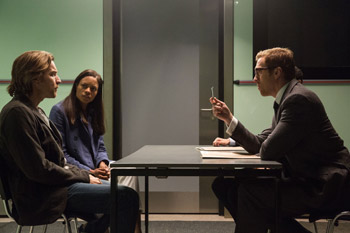 'I've always wanted to work with Damian Lewis and it was great to do this as we have some very interesting scenes together," says Ewan McGregor. 'Perry looks to Hector as a James Bond character but he also sees his flaws. Hector doesn't always tell the truth and Perry has to question what's happening between them. That's a great relationship to play."
'I've always wanted to work with Damian Lewis and it was great to do this as we have some very interesting scenes together," says Ewan McGregor. 'Perry looks to Hector as a James Bond character but he also sees his flaws. Hector doesn't always tell the truth and Perry has to question what's happening between them. That's a great relationship to play." Working with Director Susanna White
When looking for a director for Our Kind Of Traitor, producer Gail Egan and her partners were impressed by the different genres White has tackled on screen - from Generation Kill to Nanny McPhee and the Big Bang to Jane Eyre.
'And this is different again!" says Gail Egan. 'She's a great filmmaker but one of her great strengths is with cast. They adore her and will go for the extra mile for her. She works very hard and they notably appreciate it. She recognises what actors need and she creates the environment for them to express themselves and do it with their own conviction to get underneath the characters they are playing."
Damian Lewis talks of the winning relationship Susanna White enjoyed with her cast. 'She's got a very calm, winning energy on set," he says. 'As a director, Susanna White is quite happy to leave people alone to do their thing, so there is a tremendous freedom. But she will always come in and nudge and steer you if she feels you might be going off track. I would work with her again in a flash."
One of Susanna White's great strengths is her ability to trust the people who work for her. 'I was given a lot of freedom to go away and write what I wanted," says Hossein Amini. 'Susanna White encouraging but never prescriptive."
'Susanna White is so knowledgeable and passionate that she instils that passion in you as the performers," adds Naomie Harris. 'She's been great at leading us into this world and getting us to understand how to play in that world."
Production designer Sarah Greenwood relished working with a woman. 'It was fantastic to work with a female director," she asserts. 'It's always very different working with different directors and what they bring to it. Susanna White has a very firm idea of what she wants. When you present something as an idea, or change something in the script which maybe doesn't work so well, she's very open."
Susanna White partly drew on her experiences working with the marines on Generation Kill to give Our Kind Of Traitor its thrilling kinetic energy.
'One of the things that drew me to Our Kind Of Traitor was the idea of male violence and how that defines you or doesn't define you," the director explains.
'The part of the process that I really enjoyed was practicing the fight scenes, getting them to feel as authentic as possible and seeing how that fitted with character. In rehearsals we explored the different layers of these characters to make them feel as grounded and real as possible. I wanted to make the fights feel visceral and real, and feel like the acting was balanced on a sixpence. I wanted to explore the delicacy and emotion in a performance but also the brutality. One moment you are in the world of a five-star Swiss hotel and the next you go through a door and you're in a knife fight in a kitchen. For the fight scenes we spent a lot of time rehearsing and setting up the cameras to get the best angles. It was a very technical exercise to make it seem simple and real. I love the challenges of that. It is one of the aspects of my job I love the most."
Susanna White's emphasis on this delicate balancing act impressed cinematographer Anthony Dod Mantle and helped to entice the Oscar® and BAFTA winner (for Slumdog Millionaire) aboard the project.
'In our original meeting Susanna White made certain references to family amidst this world of violence and embezzling and financial exploitation," he recalls. 'The bottom line for Dima, one of our main characters, is that everything he does is based on what he feels is of worth in his life. This is not money or luxury apartments but his family and their future and their survival. I liked that Susanna White wanted to make that a significant, underlying element. That Dima, for all his violence and historical corruption seems an incredibly likeable and adorable and enigmatic person. I think that's what's interesting about the film. I'm not the least bit interested what country you travel to, it's about how these people travel in relation to each other and their journeys, particularly Ewan's character and certainly Stellan Skarsgard's journey at the end."
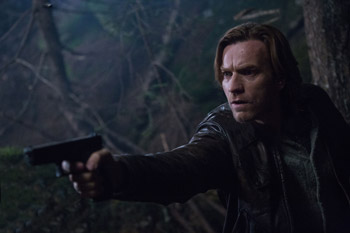 Stellan Skarsgård had never worked with White before. 'I called my son Alexander who did Generation Kill with her, and he said, -You would have a lot of fun with her. You can't say no'," he smiles.
Stellan Skarsgård had never worked with White before. 'I called my son Alexander who did Generation Kill with her, and he said, -You would have a lot of fun with her. You can't say no'," he smiles. Achieving The Look Of Our Kind Of Traitor
'The wonderful thing about this film is that it enabled me to flex a lot of muscle as a filmmaker," says Susanna White. 'Visually it is an incredible world in terms of location, and intellectually it is very challenging. I was very lucky that I got this incredible team on board with whom to explore those incredible ideas. The great thing about doing le Carré is that everyone wants to work on it, so we were able to get real A-listers in terms of heads of departments to come on board."
Those A-listers are cinematographer Anthony Dod Mantle, production designer Sarah Greenwood and costume designer Julian Day.
The rich textural world of Our Kind Of Traitor is established from the outset by an opening sequence featuring the dramatic motifs of a ballerina, a forest and snow.
'What I wanted was a strong image of a man suspended in the air," White explains. 'And so – thinking blue sky because it's le Carré – I thought, -who would I like better than anyone in the world to do that? Well,' I thought, -Carlos Acosta, who is the perfect image of masculinity'. I emailed him, and he rang straight back and said -I really want to be a part of this, let's see how we can make it happen'. It is wonderful doing a le Carré, everyone wants to be a part of it."
The incredible slow-motion sequence of Acosta was crafted by Dod Mantle.
'I knew if one man in the world could make something extraordinary out of this, take an idea and make it ten times better, it was Anthony," says Susanna White. -It was thrilling to explore the world of the movie with him."
Dod Mantle, whose credits include Dogville, Manderlay, Slumdog Millionaire, Rush and 127 Hours, worked with multiple, sometimes hidden, cameras to give each scene a unique perspective. 'Anthony would be hiding cameras everywhere when we were shooting a scene. Sometimes I wouldn't even know," says Susanna White. 'I would be looking at shots I didn't even know we had a camera on because Anthony would be so inventive, and be trying things out all the time. It is great to work with people at the top of their game."
Dod Mantle used the small almost-hidden cameras to capture the fast-moving cosmopolitan world of Our Kind Of Traitor.
'An awful lot of this film is moving," he says. 'I had to structure and package my equipment and to minimalise the stuff I use, including the lenses, because we had to move so often so fast, so quickly and in such small spaces."
Our Kind Of Traitor shot for 10 weeks in spring 2014 in Finland, the UK, Paris, the French Alps, Bern and Marrakech. It used some 90 sets and filmed in around 50 different locations. 'One of the things I really fought for was to get as many big and dramatic locations into the movie as I could," says Susanna White. 'It was crucial to me that we opened the movie with these big Russian landscapes, so you feel where that money has come from, you feel the natural resources of Russia, and to give that sense of scale."
The Russian exteriors were filmed in Finland, with the interior of the Bolshoi ballet recreated in London, and The Dorchester hotel standing in for the Bellevue hotel in Bern. 'We never went to the same place twice and we were always moving," says BAFTA-winning production designer Sarah Greenwood, whose credits include Atonement, Anna Karenina and Guy Ritchie's Sherlock Holmes. 'We were not in any place longer than a day, constantly moving. It was a bit like a road movie."
The fast pace of the shoot allowed Dod Mantle to work intuitively, as different characters encouraged him to move the camera and frame a scene in a certain way.
'I move the camera based on an emotional instinct I have as to where we are in the story and what the psychological mood of the scene is," he explains." It's a speedy aesthetic. I wouldn't call it hand-held as such, it's like a mixture of something between Steadicam and handheld. It's a gliding that allows me to be inquisitive."
The film reveals worlds within worlds and the different faces of the people who inhabit them. As the production designer, Sarah Greenwod relished those nuances.
'Our Kind Of Traitor is very expansive," she says. 'I liked the challenge of creating worlds that we don't see and worlds that we don't know. It's very interesting to see how these societies work. What we're seeing in this film is British high society, as well as inside the British government and banking. They are fascinating worlds to step into."
Our Kind of Traitor
Release Date: July 14th, 2016
Have You Seen This?
MORE
- Mission: Impossible Fallout
- Glenn Close The Wife
- Allison Chhorn Stanley's Mouth Interview
- Benicio Del Toro Sicario: Day of the Soldado
- Dame Judi Dench Tea With The Dames
- Sandra Bullock Ocean's 8
- Chris Pratt Jurassic World: Fallen Kingdom
- Claudia Sangiorgi Dalimore and Michelle Grace...
- Rachel McAdams Disobedience Interview
- Sebastián Lelio and Alessandro Nivola...
- Perri Cummings Trench Interview

